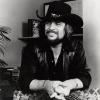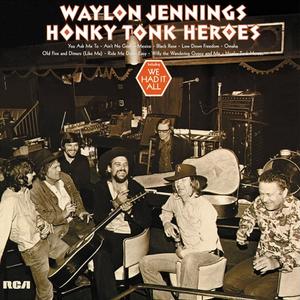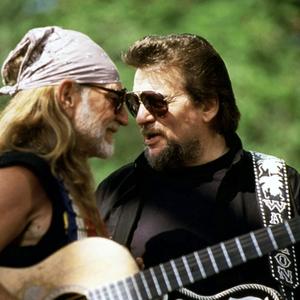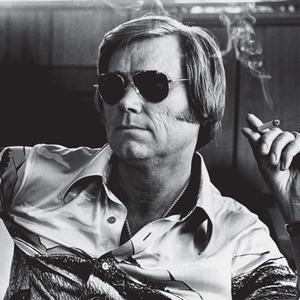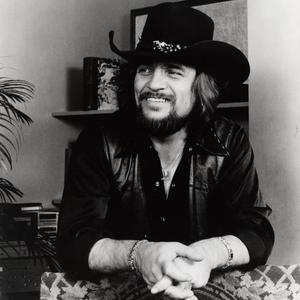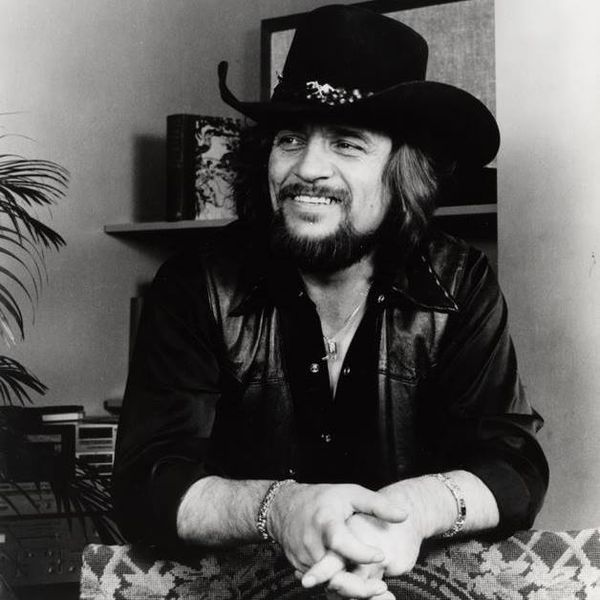




Link copied

From his scraggly beard and unkempt hair to that bellowing baritone voice, Waylon Arnold Jennings personified the concept of outlaw country before it was an acknowledged genre.
More so than even his fellow Highwaymen peers Johnny Cash and Willie Nelson, the Texas-born-and-raised Jennings exuded the rebellious swagger that defined the darker, edgier style of country he spearheaded in the 70s.
Here are 20 examples of Waylon at his most potent, for The Best Waylon Jennings Songs List:
Ned Kelly
Few remember that this 1970 movie - known primarily as being Mick Jagger’s second acting role - had an intriguing soundtrack that featured, among others, a pre-fame Waylon singing Shel Silverstein songs.
Its title track, an acoustic, folksy, story song finds Jennings recounting the tale of the titular outlaw. Worth searching for since it shows the roots of the singer’s sound before it was solidified.
The Chokin' Kind
Waylon and his Waylors group first released this Harlan Howard-penned tune in 1967. It hit no.8 on the US Country chart but became a bigger hit for soul man Joe Simon, who won a Grammy for it three years later.
Waylon’s version gets down and dirty as he castigates his girlfriend whose love scares him to death.
This Time
One of Jennings’ earliest no.1 country hits (recorded 1973) had help from co-producer Willie Nelson and feels more like West Coast folk than country, even with Mickey Raphael’s ever-present harmonica.
He’s coming back to his love interest but, like in many of his other songs, he’s warning her it’ll be the last time if she doesn’t treat him better.
Good Ol' Boys
Perhaps not the best Waylon song, but surely one of his most recognizable ones, this was the theme from the popular 80s TV show The Dukes of Hazzard.
That, and lyrics which preceded by a few decades contemporary “big hat” commercial style, helped it notch the top spot on the country charts in August 1980.
Ladies Love Outlaws
This 1972 tune was the title track to what many consider Waylon’s first full “outlaw” styled album, and not just because that word was used in its title.
Written by Lee Clayton, it nonetheless crystalized Jennings’ “doing it my way” image especially since Waylon and wife Jessi Colter’s names were featured in the final verse.
Are You Sure Hank Done It This Way
Another song about the trials and tribulations of life on the road “with a five-piece band that sees the back side of me”, this Jennings composition featured the distinct stomping country beat closely identified to his style.
It made it to the top of the C&W charts only for a week but is one of Jennings’ most evocative compositions.
Bob Wills is Still the King
“I grew up on music we call Western Swing” sings Jennings, who is proud to be from Texas where “Bob Wills remains the king.”
The B-side to ‘Are You Sure Hank Done It This Way’ got a fair amount of airplay on its own and is pure Jennings (Willie Nelson is also name checked) until about three-quarters through, when the tempo changes to something closer to Wills’ music.
Waymore's Blues
Another deep cut that was not a hit but remains a favorite among Jennings fans, ‘Waymore’s Blues’ was included on 1975’s Dreaming My Dreams album, the singer’s first million-seller/gold certified release.
The stripped-down accompaniment has a jazzy feel led by electric piano and crafty lyrics that are clearly autobiographical, particularly about his legendary womanizing (“Well I got a good woman, what’s the matter with me / What makes me wanna love every woman I see?”).
Are You Ready for the Country
Neil Young never released this Harvest deep track as a single, so Waylon took a crack at it and made the song the title of his 1976 album.
It remained a fan favorite if only for the lyrics “Are you ready for the country / Are you ready for me” and was even re-recorded in 1995 (produced by son Shooter) for one of his final studio albums.
Ain't Living Long Like This
Rodney Crowell’s classic country rocker, also recorded by Emmylou Harris, about a criminal recounting his lowdown life, was a natural for Jennings’ lonesome, ornery and mean persona.
It became a no.1 country smash for him in 1970 (his 12th), something which eluded the previous recordings. Youngsters and gamers might know the tune from its inclusion on the Grand Theft Auto V soundtrack.
Only Daddy That'll Walk the Line
Waylon just missed the top slot in 1968 (it made it up to no.2 on the country listing) for this song that mixed soulful backing vocals and organ with the modified twang that typified country music of the time.
Even lines like the opening “Everybody knows you’ve been steppin’ on my toes” sound menacing, as Jennings threatens to leave his girlfriend with the “funny little moods” who is getting on his nerves.
Luckenbach, Texas (Back to the Basics of Love)
Jennings claims to have never liked this Chips Moman/Bobby Emmons classic, which hit no.1 country (and no.25 pop!) in 1977. But since he was name-checked in it, along with Willie Nelson (who guests on the final chorus), Hank Williams and Mickey Newbury, he relented.
The bittersweet story of a wealthy couple that might move to the titular city to save a crumbling marriage clearly touched nerves in the audience and made it one of Jennings’ most popular hits.
Mammas Don't Let Your Babies Grow Up to Be Cowboys
Sure, it’s identified as much with Willie Nelson as Jennings, but this 1978 Country chart-topping duet found the sweet spot between Nelson’s quivering voice and Waylon’s booming growl.
It was an instant classic due to its simple yet persuasive warnings to mothers not to rear sons who would “rather give them a song than diamonds or gold”.
I May Be Used (But Baby I Ain't Used Up)
This 1984 tune succeeds on its title alone as the 46-year-old Jennings sings with the gruff, get-off-my-lawn voice of a guy who’s a few decades older.
He’s definitely ready for some hot-lovin’ though, convincing a potential romantic interest that “It ain’t how you look, it’s what you got under the hood”. Bad to the bone!
I'm a Ramblin' Man
Not to be confused with different songs written by Hank Williams Sr. or The Allman Brothers Band, this Ray Pennington hit captures Jennings’ spirit in its clippity-clop beat and the singer’s admonition not to mess around, or fall in love, with him “cause he’s, you know, a rambling” man.
Jessi Colter did not heed that warning.
I've Always Been Crazy
This self-penned 1978 country no.1 was written in the midst of Jennings’ well publicized cocaine-abusing years.
It’s a reflective, even sad twanger with the apologetic lyrics “I can’t say I’m proud of all the things that I’ve done / But I can say I’ve never intentionally hurt anyone”, some of the most personal of his career.
Lonesome, On'ry & Mean
The title track of Jennings’ first RCA label album under a contract that gave him artistic control wasn’t written by him (Steve Young is the author) but it encapsulated his renegade spirit and was the perfect re-introduction of the new, ruggedly individualistic Waylon.
The song is about a trucker whose travails and travels created the titular personality - one, who we learn in the final verse, he does not want to be identified with.
Rainy Day Woman
Another early (1974) gem co-written with fellow outlaw Tompall Glaser that’s a little more traditional than some of edgier music he would later release.
Its catchy melody pushed it to the top - well, no.2 - of the country charts. The peppy (check out that pedal steel solo) yet rather angry story about a woman who never looks on the bright side of things, upsets Jennings as he sings “If it ain’t one thing / It’s another one on the way”.
Closing In on the Fire
Jennings’ final studio album (from 1998) was a comeback of sorts and featured this title track, a sizzling slice of swamp rock written by the king of that genre, Tony Joe White.
Jennings growls from the depths of his soul as a harmonica that sounds like it’s played by the devil moans and a gospel singer wails in the background.
It proved that, even at this late stage (he passed four years later), Jennings had plenty of gas left in the tank.
Honky Tonk Heroes
This is the title tune to the 1973 album that broke Jennings, and by association Billy Joe Shaver (who wrote it and most of the rest of the classics), into widespread popularity.
The song wasn’t a hit, but it helped define the singer, and its combination of edgy country with rock and roll kick started a path forward Jennings seldom wavered from.
---
Listen to Holler's The Best Waylon Jennings Songs playlist below:
For more on Waylon Jennings, see below:
READ MORE:

